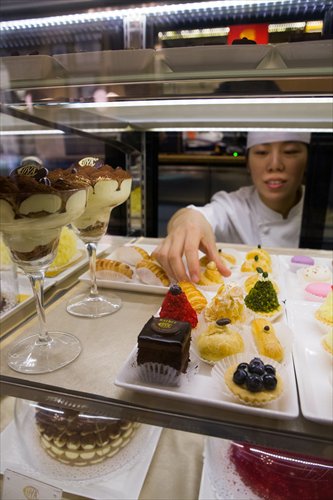
A chef displays desserts at COVA Beijing, an Italian-style dessert restaurant that belongs to French luxury brand Louis Vuitton. (Photo: Li Hao/GT)
A question of sustainability
Despite enjoying his lunch, Zhang could not help wondering whether the "luxury restaurant" concept was sustainable.
"What makes many consumers eager to try these kinds of restaurants is not the food they have. It is the novelty of the experience and the concepts associated with a lifestyle of luxury or high-quality personal taste that draws them," he said.
"But after the novelty wears off, it will be hard for luxury restaurants to keep repeat customers," said Zhang.
He said the average Chinese person could get similar types of food at a lower price. For example, he said, people can taste delicious small steamed buns and pan fried pork buns in Shanghai's street restaurants, which only costs them around 10 yuan, and be adequately fed.
Zhang concedes that many Chinese, especially young people, are willing to spend hundreds of yuan to enjoy dishes and snacks with a higher price tag, but said as the most important thing for them is to satisfy their need for luxury brands, they might lose interest quickly.
Zhang said luxury-branded restaurants can fill the gap for people who can't afford luxury goods but want to experience the lifestyle.
"Most of them can't afford a luxury bag or watch. But hundreds of yuan for one dinner per month in a luxury-branded restaurant is acceptable to them," he said.
"[Still,] food should be the core part to compete with other restaurants in China, such as Michelin-starred restaurants."
Zhao shares the same outlook. Compared with other Western-style restaurants in China, the advantage for luxury restaurants is their brand appeal, according to Zhao. "Usually, the food and service will not be much of a surprise for foodies. Their brand, as the selling point, is the most attractive thing to most consumers," he said.
Zhao suggested that except for attracting big fans of luxury brands, a business model that relies solely on brand effect is unlikely to garner a lot of repeat customers. "Adding more creative ideas and adapting the food to Asian tastes are key elements to attract more customers," he said.
China as an important market
Breaking into the Chinese food industry is a smart choice for luxury brands in light of current economic trends, said Huang in the report.
Due to the slow development of the global economy, China's anti-corruption policy and the upsurge in e-commence in China, the sales of luxury goods went down in 2014. Therefore, luxury brands should expand their sales model and add more diverse elements to their brands, Huang said in the report.
"Luxury brands gradually turn themselves from selling brands and products to selling a lifestyle, which includes restaurants," said Zhou Ting, director of Fortune Character Institute, a high-end lifestyle research and advisory body in China, in the China Business News report.
Citing Gucci, which manufactures the menus, cutlery, and napkins used in its restaurants, as an example, Zhou said that branded restaurants could extend their presence offline by applying their brand to other forms of functional products.
The report also said that it is easier for restaurants and coffee shops to reach the public because they can satisfy people's daily needs. Luxury brands are willing to attract more middle-class consumers, especially young Chinese. They can cultivate their consumption habit and turn them into their consumers.
Patrizio Sacchetto, director of operations at COVA Beijing, said many luxury brands chose to break into the food business due to its popularization. Luxury brands can use their high-quality food, service and international vision to attract consumers.
For Sacchetto, breaking into the food business can add variety and competition to the luxury brand sector as well as give access to the roughly 80 percent of people who would not normally be able to buy luxury goods.
"China is an important market for us. Chinese young people are our target because they are open-minded and willing to try new things," said Sacchetto.
That notion is reflected in the Beijing community's blossoming obsession with food. According to a recent report by Xinhua News Agency, Beijing's restaurant industry raked in 84.7 billion yuan in 2015, representing a year-on-year increase of 3.3 percent. That accounts for 8.29 percent of retail sales of consumer goods in the city.
To broaden its consumer base in China, COVA Beijing opened a social media account on Sina Weibo and is building a website.
"Soon, our customers will be able to buy our products online," said Sacchetto. "We are planning to open more restaurants in Chengdu, Sichuan Province and Shenzhen, Guangdong Province in the future, and we will hire local people who know much more about China and Chinese."


















































